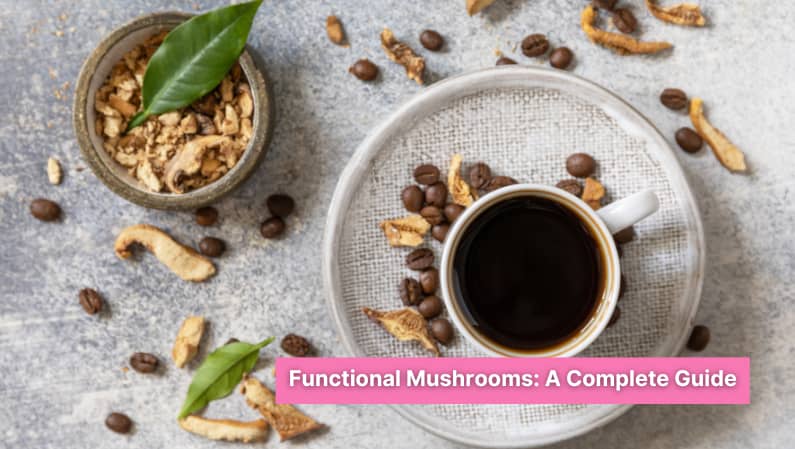The popularity of functional mushrooms 🍄 is at an all-time high, and how could I miss the trend and see what it is all about? In this guide, we will dive deeper into the world of adaptogenic mushrooms, starting from what they are -and what they are not, to their different functions, and how to best consume them. In the end, my go-to healthy recipes with my favorite functional mushroom extracts from Performance Fungi. (And a sneaky discount you can use to test out their benefits for yourself). 🤫
But first, let’s take a step back and have a look at what functional mushrooms are, and why they are different from hallucinogenic mushrooms.
Functional Mushrooms: what are they?
Functional mushrooms, or adaptogenic mushrooms, like reishi, cordyceps, and Lion’s mane are a fascinating category of fungi that possess the incredible ability to adapt to the needs of your body and mind and support overall well-being. From here the term “adaptogenic”.

But how do they work? Adaptogens can communicate with the body’s stress response system, particularly the hypothalamic-pituitary-adrenal (HPA) axis. This way, they help regulate the production of stress hormones, such as cortisol, promoting a more balanced and modulated response to external and internal stressors. As such, functional mushrooms do not cause any psychedelic or hallucinogenic effects -as is the case for psychotic or hallucinogenic mushrooms. Hence, they are 100% legal and safe to use.
Although adaptogenic mushrooms have been used for centuries in traditional medicine systems, modern research is only now starting to uncover the impressive health benefits of these non-psychotic fungi, and more and more people are resorting to them to treat problems of various kinds. From strengthening to immune system to relieving stress and anxiety, and having a more balanced gut, there is nothing that mushrooms cannot do!
Adaptogenic Mushrooms vs. Hallucinogenic mushrooms 🔮
Adaptogenic mushrooms and psychedelic mushrooms are on the rise lately! While they may share some similarities, they vastly differ in many aspects, first and foremost in their effects and use.

On one hand, adaptogenic mushrooms -such as Reishi, Chaga, and Cordyceps– can help our body adapt to stress and have a sharper mind, promoting a more adaptive and balanced reaction to life’s challenges. Plus, they are rich in antioxidants and other compounds that can raise our energy levels and strengthen our immune response.
On the other hand, psychedelic mushrooms, or magic mushrooms, contain psychoactive compounds like psilocybin and can open the doors to altered states of consciousness. In particular, they can lead to hallucinations, introspective journeys, and potential shifts in perception of reality.
As far as their use is concerned, adaptogenic mushrooms are incredibly versatile and simple to use in the kitchen. You can either toss them into your morning smoothie, stir them into soups, or sprinkle them on your salad for a health boost without altering your reality. Psychedelic mushrooms, on the other hand, should be used with caution because of their mind-altering effects and may not be well tolerated by some people. while functional mushrooms are generally legal and widely celebrated in the wellness community, psychedelic mushrooms may not be, depending on location or use.
Functional Mushrooms: The 7 Most Popular Types, and When To Consume Them 👌🏼
Not all mushrooms are the same! Here are the seven most popular types of adaptogenic mushrooms, their properties, and how to consume them to make the most out of their exceptional health properties.
1. Reishi (Ganoderma lucidum):
- Description: Known as the “Mushroom of Immortality,” reishi has a shiny, reddish-brown cap and is sought after for its immune-boosting properties and potential stress-reducing benefits.
- Benefits:
- Stress Relief: Calming properties that may help manage stress.
- Immune Support: Supports a healthy immune system.
- When to Consume: Best taken in the evening for its calming effects. Can be consumed as a tea, tincture, or in powdered form in beverages and recipes.
2. Chaga (Inonotus obliquus):
- Description: Resembling a dark, burnt mass on birch trees, Chaga is beneficial for overall health, wellness, and skin protection.
- Benefits:
- Antioxidant Power: Packed with antioxidants, Chaga helps to support overall well-being by combating oxidative stress.
- Immune Boost: Promotes a healthy immune system.
- When to Consume: Chaga can be consumed both in the morning, or afternoon. It can be brewed into a tea, added to coffee, or consumed as a tincture or powder.
3. Cordyceps (Cordyceps sinensis):
- Description: Cordyceps is a parasitic fungus that grows on caterpillar larvae in the wild. The cultivated form is more commonly used in supplements. It is by far one of the top pick mushrooms, especially among athletes and fitness enthusiasts, due to its energy and stamina-boosting properties and its ability to enhance athletic performance. It’s an excellent choice for those leading an active lifestyle.
- Benefits:
- Energy Boost: Enhances vitality and physical performance.
- Respiratory Support: Supports respiratory health and helps to combat asthma and seasonal allergies.
- When to Consume: In the morning or before physical activity. Can be added to smoothies, coffee, or taken in supplement form.
4. Lion’s Mane (Hericium erinaceus):
- Description: Recognizable by its cascading white, shaggy appearance, the lion’s mane is another extremely effective adaptogenic mushroom. It is renowned for its potential to enhance brain function, memory, and mental clarity. It’s particularly popular among students, professionals, and seniors who are keen on mental performance.
- Benefits:
- Cognitive Support: It may enhance memory and mental clarity.
- Nervous System Support: Supports a healthy nervous system.
- When to Consume: Anytime during the day. It is commonly added to coffee, and tea, or taken in supplement form.
5. Ashwagandha (Withania somnifera):
- Description: While not a mushroom but a root adaptogen, ashwagandha is often included in adaptogenic discussions.
- Benefits:
- Stress Reduction: Known for its stress-relieving properties.
- Adrenal Support: Supports adrenal function.
- When to Consume: Anytime during the day, but often taken in the evening. Can be added to warm beverages, and smoothies, or taken as a supplement.
6. Turkey Tail (Trametes versicolor)
- Description: With its circular, multicolored bands resembling the tail feathers of a turkey, the Turkey Tail mushroom is rich in polysaccharides, offers robust immune support, and may promote gut health.
- Benefits:
- Immune Support: Turkey tail mushrooms are rich in polysaccharopeptides (PSP) and polysaccharides, which are believed to support the immune system.
- Antioxidant Properties: Abundant in antioxidants, turkey tail helps combat oxidative stress and reduce inflammation.
- Gut Health: The prebiotic fibers in turkey tail can contribute to a healthy gut microbiome.
- When to Consume: Anytime during the day. It can be added to warm beverages, broths or soups, and smoothies, or taken as a supplement.
7. Maitake (Grifola frondosa)
- Description: Maitake mushrooms form large, layered clusters with frilly edges, resembling a feathery hen’s tail or a bouquet of leaves. In addition, it is certainly the most unique in flavor and can be used in manifold culinary preparations. Recent studies highlight its potential in stimulating the immune system and possibly aiding in the regulation of blood sugar levels.
- Benefits:
- Immune Support: Maitake mushrooms contain beta-glucans, compounds known for their immune-stimulating properties.
- Antioxidant Properties: Abundant in antioxidants, maitake helps combat oxidative stress and inflammation, contributing to overall well-being.
- When to Consume: Anytime during the day. It can be added to stir-fries, risotto, broths or soups, teas, and smoothies, or taken as a supplement (both in capsules, powder, or tinctures).
How to Consume Functional Mushrooms 🍄
As hinted above, you can consume mushrooms in both supplements, tinctures, and infusions. Each of them caters to different needs and preferences. Therefore, choose the one that allows you to make mushrooms part of your daily routine!

1. Capsules or Powder:
- Description: Mushroom extracts are encapsulated or ground into a powder form.
- Benefits: Capsules and powder are the easiest and most convenient way of adding adaptogenic mushrooms into our daily routine. Plus, they allow for more precise dosing.
- Usage: Taken with water or added to smoothies, beverages, or other culinary preparations.
2. Teas and Infusions:
- Description: Dried mushrooms or extracts are steeped in hot water to create flavorful teas.
- Benefits: They are enjoyable and soothing, and provide a warm beverage experience.
- Usage: Suitable for various mushroom types, such as cordyceps and reiki, offering a calming ritual.
3. Tinctures:
- Description: Extracts of mushrooms in alcohol or glycerin form.
- Benefits: They are concentrated, easily absorbed, and convenient for on-the-go use.
- Usage: Typically taken sublingually (under the tongue) for rapid absorption or added to beverages, smoothies, soups, and other culinary preparations.
4. Culinary Applications:
- Description: Some mushrooms, such as maitake and turkey tale can also be incorporated -fresh or dried- into different recipes, from stews to stir-fries, and soups.
- Benefits: They are a good way to add flavor and nutritional value to your dishes.
- Usage: Stir-fries, soups, stews, or roasted dishes.
5. Functional Foods and Beverages:
- Description: Finally, mushroom extracts can be infused into various food products.
- Benefits: It is a simple way to incorporate them into your daily meals and snacks for added nutrition.
- Usage: Mushroom-infused products, such as coffee, chocolate, or energy bars.
The Experts’ Advice 👩🏽⚕️
Always keep in mind that some raw mushrooms need to be processed to unlock the active compounds within them and make them available to our bodies for use. Otherwise, they’re just excreted as waste. Second, by extracting these mushrooms, we concentrate the compounds in meaningful amounts that can be much more beneficial than consuming raw mushrooms alone. This is why experts recommend opting for tinctures and powders to best reap all the benefits these amazing mushrooms can gift us!
In any case, although adaptogenic mushrooms are generally safe and well-tolerated, don’t forget to ask for professional advice before incorporating new mushroom supplements into your routine, especially if you have pre-existing health conditions, such as allergies or autoimmune conditions, or are taking medications, primarily blood thinning, and statins.
Performance Fungi: my Adaptogenic Mushrooms of Choice! 💯
I recently had the opportunity to experiment with Performance Fungi’s mushroom tinctures, and I cannot wait to share my incredibly positive experience with you! But first, let’s talk briefly about Performance Fungi.
Performance Fungi is an amazing veteran-owned, U.S.-based company offering a wide range of vegan, non-GMO, and completely gluten-free mushroom tinctures. As explained above, mushroom tinctures are generally way more absorbable by the body than raw or powdered mushrooms, and are also easier to dose, and consume.
As soon as I started taking them, I noticed a clear improvement in my focus and mental clarity, as well as more sustained energy throughout the day. In addition, my sore throat that was lingering went away when I started doubling up on the immunity drops!
My favorite application has been adding the recommended daily dose of drops to my coffee in the morning. However, I understand that not everybody loves coffee as much as I do, or can’t drink it at night. This is why I came up with some easy and delicious recipe ideas to incorporate the tinctures into my daily meals. The recipes can all be easily personalized based on your nutritional needs and what you have at hand.
The only recommendation is to refrain from baking with the extracts, as the beneficial compounds in them can be sensitive to high temperatures. Ideally, they shouldn’t be heated beyond 185°F. However, a great workaround would be to incorporate the extracts into post-baking elements, like icings or drizzles, as this would ensure the compounds remain active.
Three Delicious Ways to Incorporate Functional Mushrooms into Your Daily Routine! ☕
vedo altre descrizioni ricette + other recipes from the blog (cards)
caitlin’s experience
Winter Spice & Citrus Smoothie with Adaptogens 🍊

Ingredients:
- 1 cup unsweetened almond milk
- 1/2 cup Greek yogurt (or plant-based alternative)
- 1/2 frozen banana
- 1/2 cup frozen berries (such as blueberries or mixed berries)
- 1/2 orange, peeled and segmented
- 1 tablespoon chia seeds
- 1 teaspoon honey or maple syrup (optional, depending on sweetness preference)
- 1 teaspoon adaptogenic mushroom powder (e.g., reishi or chaga)
- 1/2 teaspoon ground cinnamon
- 1/4 teaspoon ground ginger
- A pinch of nutmeg
- Ice cubes (optional)
Instructions:
- Blend all the ingredients until smooth.
- Adjust sweetness according to your taste.
- Pour into a glass and enjoy the stress-busting goodness!
2. Adaptogenic Mushroom Matcha Latte 🥛

Ingredients:
- 1-2 tbsp matcha powder
- 1/2 cup milk of choice (almond, coconut, or oat)
- 1 teaspoon adaptogenic mushroom powder (e.g., chaga or lion’s mane)
- 1 tablespoon coconut oil or ghee
- Ice cubes (optional)
- Optional: Sweeten with honey or maple syrup to taste
Instructions:
- In a saucepan, heat the milk and coconut oil or ghee until warm.
- Wisk with the matcha powder with the milk, making sure to dissolve any lumps.
- In a blender, combine brewed coffee or tea, warm milk mixture, and adaptogenic mushroom powder.
- Blend until frothy.
- Pour into your favorite mug, and add some ice cubes if desired. Enjoy!
3. Adaptogenic Mushroom Chocolate Frosting 🍫

Ingredients:
- 1 cup soaked cashews (soak for at least 2 hours)
- 1/4 cup coconut oil, melted
- 1/4 cup maple syrup or agave nectar
- 2 tablespoons cacao powder
- 1 teaspoon vanilla extract
- 1 teaspoon adaptogenic mushroom powder (e.g., reishi or cordyceps)
- Pinch of salt
Instructions:
- Drain the soaked cashews and blend them in a food processor until smooth.
- Add melted coconut oil, maple syrup, cacao powder, vanilla extract, adaptogenic mushroom powder, and a pinch of salt. Blend until well combined.
- Taste and adjust sweetness if needed.
- Use the frosting to top your favorite cakes or cupcakes. It’s a divine combination of chocolatey goodness and adaptogenic magic.
Hope this article has helped you delve deeper into the magic world of adaptogenic mushrooms! Have you already tried them? If yes, please share your experience in the comments. 💗 And don’t forget to use the code CAITLIN for 15% off your Performance Fungi orders!




